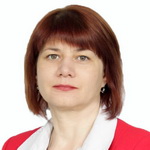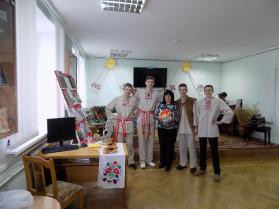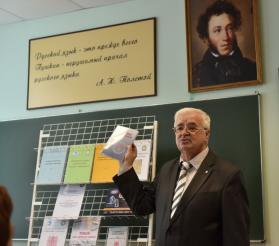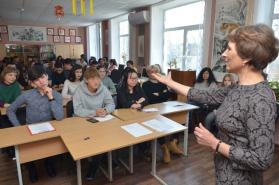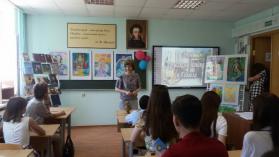Contacts
Tel: +375-232-57-30-39
E-mail: philology@gsu.by
Site: http://philology.gsu.by/
History reference
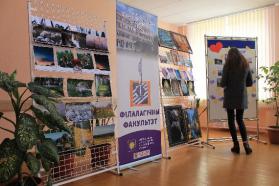 The history of the Faculty of Philology begins with the appearance and establishment of Gomel Pedagogical Institute. In 1935, the Faculty of Literature and Language was opened. Later it was called Literary, Philological, Historical and Philological (until 1988). The faculty was headed by deans G.S. Evdokimenko, PhD in history, associate professor; D. A. Leonchenko, PhD in philology, associate professor; T. I. Ezepova, PhD in history, associate professor; N. F. Gulitsky, PhD in philology, associate professor; V. D. Evtukhov, PhD in philology, associate professor; V. A. Bobrik, PhD in philology, associate professor.
The history of the Faculty of Philology begins with the appearance and establishment of Gomel Pedagogical Institute. In 1935, the Faculty of Literature and Language was opened. Later it was called Literary, Philological, Historical and Philological (until 1988). The faculty was headed by deans G.S. Evdokimenko, PhD in history, associate professor; D. A. Leonchenko, PhD in philology, associate professor; T. I. Ezepova, PhD in history, associate professor; N. F. Gulitsky, PhD in philology, associate professor; V. D. Evtukhov, PhD in philology, associate professor; V. A. Bobrik, PhD in philology, associate professor.
The Faculty today
The Faculty of Philology is one of the oldest at the university. It consists of 4 departments: Belarusian language; Belarusian literature; Russian, General and Slavic Linguistics; Russian and World Literature. All departments are engaged in the educational process not only at the Faculty of Philology, but also at other faculties of the university. Highly qualified personnel work at the departments. The educational process engages 47 lecturers, among whom there are 8 Doctors of Philology and 31 PhDs in Philology.
The faculty prepares highly qualified specialists in the field of linguistics and literary criticism, teachers of the Belarusian language and literature, teachers of the Russian language and literature, literary and editorial staff, specialists in the field of computer philology, teachers of Russian as a foreign language, teachers of the Russian and Chinese languages. 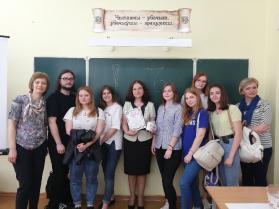 Graduates of the faculty become scientists, writers, local historians, work in research centers, higher education institutions, museums, archives, departments, the media, the government and the administration, public associations.
Graduates of the faculty become scientists, writers, local historians, work in research centers, higher education institutions, museums, archives, departments, the media, the government and the administration, public associations.
Skorina’s office, the Polish Language Office, the Regional Center for Russian Studies, the Literary and Educational Center “Patriotika”, the Literary Museum “Alma-Mater”, the Chinese Language Training Center of Shanghai Industry and Commerce Foreign Languages Institute and Francis Skorina Gomel State University, the Student Folklore Research Laboratory, the Linguistic Laboratory, computer classes, the language class for refugees training, Sinology Studies Class, Hebrew Studies Class.
The faculty has a rich and interesting student life. There are intellectual contests and quizzes, subject olympiads, literary lounges, folklore holidays, concerts, theatrical productions and many other events at the faculty. Students of the Faculty of Philology have the opportunity to be participants in summer schools, which are held at foreign universities. Student science is actively developing at the faculty. Philology students take part in scientific conferences, seminars, round tables, and have scientific publications. The student scientific folklore laboratory, headed by Prof. V.S. Novak, Doctor of Philology, is not only the center where the material collected during folklore-ethnographic expeditions is systematized, but also an active promoter of the spiritual heritage of Polesie region.
The faculty regularly holds meetings with men of science and culture, creative collectives of the city, the region, the republic, with leading scientists from universities of the republic, near and far abroad. Scientists of the faculty do research in the problems of history, lexicology, lexicography of the Belarusian and Russian languages, speech culture and stylistics; ways of formation of culture, ethnography and folklore of Belarus; new phenomena in modern Belarusian literature, literary criticism and traditions of literature from near and far abroad, etc. The research results are discussed at annual international and republican scientific and scientific-practical conferences devoted to issues of Belarusian and Russian linguistics, folklore and culture, problems of literary criticism.
The faculty has created large scientific schools in the field of linguistics and literary criticism, headed by professors V.I. Koval, O.A. Leshchinskaya, V.S. Novak, A.F. Rogalev, A.A. Stankevich, I.F. Shteiner . The peer-reviewed scientific journal “Francisk Skorina Gomel State University Proceedings” is prepared and edited. The training of scientific personnel is carried out through postgraduate studies in the specialties "Russian Language", "Belarusian Language", "Belarusian Literature" and doctoral studies in the specialty "Belarusian Language". The Faculty of Philology has a Master's degree in Linguistics and Literary Studies. At present, 327 students (including 135 foreign students) and 15 undergraduates are studying at the faculty.
Specialties
I stage
Full-time education (budget and contract):
- 1-21 05 01 Belarusian philology (directions):
- 1-21 05 01-01 Belarusian philology (literary and editorial activity).
- 1-21 05 02 Russian philology (directions):
- 1-21 05 02-01 Russian philology (literary and editorial activity);
- 1-21 05 02-02 Russian Philology (computer support);
- 1-21 05 02-04 Russian philology (Russian as a foreign language).
Part-time short-course education (budget and contract):
- 1-21 05 01 Belarusian philology (directions):
- 1-21 05 01-01 Belarusian philology (literary and editorial activity).
- 1-21 05 02 Russian philology (directions):
- 1-21 05 02-01 Russian philology (literary and editorial activity);
- 1-21 05 02-04 Russian philology (Russian as a foreign language).
Specialities
Full-time education:
- 1-21 05 01-01 Belarusian philology (literary and editorial activity):
- 1-21 05 01-01 02 Literary criticism
- 1-21 05 01-01 01 Linguistics
- 1-21 05 02-01 Russian philology (literary and editorial activity):
- 1-21 05 02-01 02 Literary criticism
- 1-21 05 02-01 01 Linguistics
- 1-21 05 02-02 Russian philology (computer software):
- 1-21 05 02-02 02 Literary criticism
- 1-21 05 02-02 01 Linguistics
Part-time education:
- 1-21 05 01-01 Belarusian philology (literary and editorial activity):
- 1-21 05 01-01 02 Literary criticism
- 1-21 05 01-01 01 Linguistics
- 1-21 05 02-01 Russian philology (literary and editorial activity):
- 1-21 05 02-01 02 Literary criticism
- 1-21 05 02-01 01 Linguistics
- 1-21 05 02-04 Russian philology (Russian as a foreign language)
- 1-21 05 02-04 02 Literary criticism
- 1-21 05 02-04 01 Linguistics
II stage
Full-time education (budget and contract), Part-time education (budget and contract):
- 1-21 80 10 Literary criticism
- 1-21 80 11 Linguistics (profiling “Belarusian linguistics” and “Russian linguistics”)
Qualification: Master
Scientific areas
Belarusian Language Department Study of main problems of modern and historical literary and dialect lexicology and lexicography; stylistics, linguistic poetics and linguistic pragmatics.
Belarusian Literature Department Determination of the role of the regional spiritual factor in the formation and development of the national way of artistic understanding of reality; analysis of the multi-level genre system of Belarusian literature in Slavic and European contexts.
Department of Russian, General and Slavic Linguistics Study of vocabulary and phraseology of Slavic and non-Slavic languages in historical-etymological, linguocognitive, linguoculturological, sociolinguistic aspects; study of the problems of linguistic stylistics and linguistics of the text.
Department of Russian and World Literature Study of sociocultural aspects of literature and folklore in the methodological correlation of the history of literature with philosophy, psychology, theory of literature, folklore and other areas of the human history cycle in the field of interdisciplinary community, which defines the specifics of humanitarian knowledge; regional-local study of folklore of Gomel region, Gomel-Bryansk-Chernihiv borderland, problems of the interaction of different ethnic folk traditions.
Абитуриенту
The Faculty of Philology of the EE “F. Skorina GSU” is waiting for everyone who loves the word, wants to be a teacher, a journalist, a poet or a writer, a linguist, a translator, a specialist in a promising direction, focused on computer technology. We train philologists in three areas: literary and editorial activities, computer support, Russian as a foreign language. In the near future, it is planned to start training in dual specialties: “The Russian language and literature / The foreign language (Chinese, English)”; “The Belarusian language and literature / The foreign language (English)”.
Students who have chosen the direction of “Literary and editorial activity” learn to use text editing techniques; master the skills of editing and proofreading; acquire the ability to edit the author’s text, taking into account modern information technologies. Graduates receive the qualification “Philologist. Teacher of the Belarusian / Russian language and literature. Literary-editorial staff.”
The “Computer Support” direction allows graduates to work with modern linguistic information resources and expert computer systems; apply skills in computer support of philological activities; use skills in automatic processing and identification of texts in professional activities; work with applied information processing systems. Graduates receive the qualification “Philologist. Teacher of the Russian language and literature. Specialist in computer philology. "
The “Russian as a Foreign Language” direction allows graduates to master modern strategies for teaching Russian as a foreign language, modern teaching technologies; use the methods and techniques of the functional-communicative approach in teaching RAFL; acquire knowledge about the national specifics of verbal communication of a native of Russian culture with foreign students; master skills of creating computer tests for diagnosis and assessment of RAFL knowledge; learn how to use electronic resources effectively in teaching Russian as a foreign language. Graduates receive the qualification “Philologist. Teacher of the Russian language and literature, Russian as a foreign language.”

